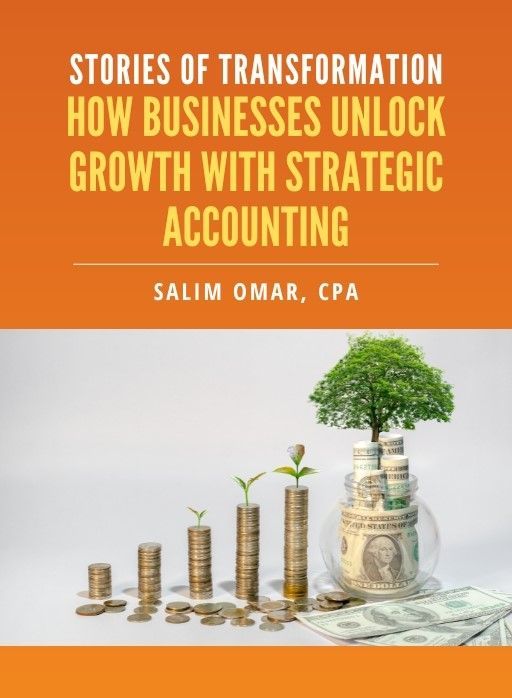Why Your Growing Business Needs More Than Bookkeeping: The Power of Integrated Financial Strategy

When a business is just getting off the ground, bookkeeping feels like the heart of financial management — and in those early days, it kind of is. You need to track your income and expenses, stay compliant, and file taxes on time.
Basic stuff. But once growth kicks in — new hires, bigger revenue, more complex decisions — relying on bookkeeping alone is like driving a race car with just the parking brake. It slows you down, exposes you to risk, and limits your ability to scale efficiently.
Let’s talk about what growing businesses miss when they treat bookkeeping as the finish line instead of the starting point — and how bringing in integrated
financial strategy can turn a reactive mess into a proactive growth engine.
Bookkeeping is Record-Keeping — Not Decision-Making
Bookkeeping is essential. No doubt about it. But it’s not designed to help you make strategic decisions. It’s about recording what already happened, not helping you plan what should happen next. Think of it like this:
- Bookkeepers track income, expenses, bank reconciliations, payroll entries, and categorization.
- But they don’t forecast future cash flow, analyze margin trends, help you decide when to hire, or run scenarios for new investments.
When businesses start bringing in six or seven figures, that backward-looking data isn't enough. Owners need forward-facing insight. And that’s where financial strategy comes in.
Real-Life Example: From Chaos to Clarity
Let’s look at a real scenario.
A regional landscaping company had strong demand, solid sales, and a loyal customer base. On paper, things looked good. But behind the scenes? Cash was always tight. The owner couldn’t figure out why there was never enough to cover payroll, even after hitting record months. They had a bookkeeper entering transactions and a tax preparer filing once a year. That was it.
Then, Straight Talk CPAs stepped in. Within the first 30 days, the team:
- Cleaned up the books to reveal profit margin inconsistencies across service lines
- Identified underpriced contracts draining resources
- Built a rolling 12-month cash flow forecast
- Set up job costing to measure actual profit per crew
- Shifted the owner from a flat salary to a tax-efficient payroll/distribution model
- Flagged a major Q4 tax liability months in advance (previously missed entirely)
Fast forward six months: They’ve hired two more crew leads, stopped underbidding, and finally have the cash cushion to breathe. That’s the difference strategy makes.
Why Integrated Financial Strategy Matters
Bookkeeping is maintenance. Strategy is momentum. When your financial support system goes beyond the basics, you get:
1. Better Tax Planning (Not Just Filing)
There’s a big difference between filing taxes and actively planning for them. A proactive CPA can reduce your tax bill through entity structure optimization, timing strategies, income shifting, and credits you’d never know to ask about. This isn’t just once a year — it’s baked into the strategy year-round.
2. Cash Flow Forecasting
Cash flow issues don’t just “happen.” They’re often predictable — if someone’s watching the trends. A forecasting model lets you see dips months in advance so you can plan around them instead of panicking when the account hits zero.
3. Scenario Modeling
Hiring a new employee? Launching a product? Entering a new market? A strong CFO service helps you model out the financial impact of decisions before you make them. This is how smart companies move with confidence.
4. Data-Driven Decision-Making
You know those gut-feel decisions that keep you up at night? With reporting dashboards, KPIs, and financial reviews, you can start replacing “I think” with “I know.” Numbers don’t lie — but you’ve got to be tracking the right ones.
5. Audit & Risk Protection
More growth = more complexity = more exposure. With CPA-level oversight and monthly reviews, risky practices are spotted early, and systems get tightened up before an audit ever happens.
How Straight Talk CPAs Makes the Shift Easy
Switching from basic bookkeeping to full-service financial strategy might sound like a leap, but it doesn’t have to be overwhelming. Straight Talk CPAs makes it simple with layered support:
- Entry-level cleanup: Get the books cleaned, categorized, and current
- Mid-tier CFO support: Cash flow modeling, financial dashboard setup, and margin reviews
- Full advisory services: Strategic planning, tax advisory, entity optimization, investor-ready financials
Clients can start where they are and scale services as the business grows. There’s no one-size-fits-all — and that’s the point.
Final Thoughts: Bookkeeping is Just the Beginning
Bookkeeping is necessary, but it’s not enough. Growing businesses need forward-looking strategy, not just tidy books. Whether you’re nearing your first million or scaling your team for the first time, integrating CPA-level insight, forecasting, and tax planning into your operations changes everything.
Straight Talk CPAs isn’t here to just crunch numbers. The goal is to help businesses move smarter, grow stronger, and avoid expensive surprises. If
bookkeeping is the foundation,
strategy is the engine — and it’s time to turn it on.
Free eBook:
Stories of Transformation


Salim is a straight-talking CPA with 30+ years of entrepreneurial and accounting experience. His professional background includes experience as a former Chief Financial Officer and, for the last twenty-five years, as a serial 7-Figure entrepreneur.




